
Agenda
|
8:30am – 9:30am |
Coffee and Networking, Innovation Showcase, Student Posters |
|
9:30 am – 10:45 am |
Panel 1 – Energy Services Delivery: Is there a changing of the guard? Moderator: Jatin Nathwani, Founding Executive Director, Waterloo Institute for Sustainable Energy; Professor & Ontario Research Chair in Public Policy, University of Waterloo
Q&As (10:30am – 10:45am) |
|
10:45am – 11:00am |
Break, Innovation Showcase, Student Posters |
|
11:00am – 12:15am |
Panel 2 – Nano-based Energy Innovations: Breakthroughs or Bust? Moderator: Holger Kleinke, Professor & Program Director, Collaborative Graduate Nanotechnology Program, Chemistry, University of Waterloo
Q&As (12:00pm – 12:15pm) |
|
12:15pm – 1:00pm |
Lunch, Innovation Showcase, Networking & Industry-Academic Collaboration, Student Posters |
|
1:00pm – 1:30pm |
Luncheon Key Note Speaker Jatin Nathwani, Founding Executive Director, Waterloo Institute for Sustainable Energy; Professor & Ontario Research Chair in Public Policy, University of Waterloo |
|
1:30pm – 2:45pm |
Panel 3 – Bioenergy Solutions: Can it shape the transition to a low carbon future?
Q&As (2:30pm – 2:45pm) |
|
2:45pm – 3:15pm |
Closing Key Note Speaker Tammy Bellamy, Senior Project Engineer (Water Services), Regional Municipality of Waterloo |
|
2:45pm – 3:30pm |
Wrap-up and Closing Remarks |
|
3:30pm – 4:30pm |
Reception, Innovation Showcase, Student Posters & Industry-Academic Collaboration |
Speakers
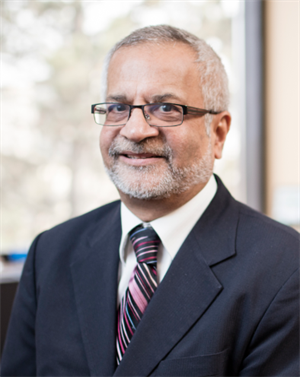 |
Jatin Nathwani Founding Executive Director, Waterloo Institute for Sustainable Energy; Ontario Research Chair in Public Policy, University of Waterloo Professor Jatin Nathwani is the founding Executive Director, Waterloo Institute for Sustainable Energy (WISE) and holds the prestigious Ontario Research Chair in Public Policy for Sustainable Energy at the University of Waterloo. His current focus is on implementing a global change initiative: he is the Co-Director, with Professor Joachim Knebel (Karlsruhe Institute of Technology, Germany), of the consortium ‘Affordable Energy for Humanity (AE4H): A Global Change Initiative’ that comprises 130+ leading energy access researchers and practitioners from 30 institutions and 16 countries. |
|
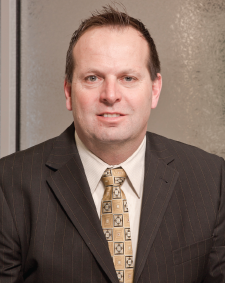 |
Raymond Tracey President & C.E.O., Essex Power Corporation Ray is responsible for the development and integration of Essex Power Corporation and its three subsidiaries into successful regulated and non-regulated businesses: Essex Powerlines, Essex Power Services and Essex Energy. Ray was appointed and served two terms as the Distributor Representative to the Technical Panel of the Independent Electricity System Operator (I.E.S.O.) which is responsible for the day-to-day operation of Ontario's electrical system. Ray is also a member of the Ontario Energy Board’s Forum Planning Steering Committee Ray served as the Chair on the Board of Directors of the Electricity Distributors Association (EDA) for the 2015-2016 term and is currently a Director on the EDA Board. Ray currently also serves in the role of Chair for the EDA Western District comprised of 9 LDCs, representing nearly 405,000 customers in Southwest Ontario. Ray served on the EDA Industry Environment Council to provide feedback for Local Distribution Companies (LDCs) on emerging policy issues and draft submissions. Ray represents the Electricity Distributors Association on the I.E.S.O Energy Transformation Network of Ontario (ETNO). Ray is past Chair and current board member of the Utilismart Corporation which is a leading edge digital energy services company. |
|
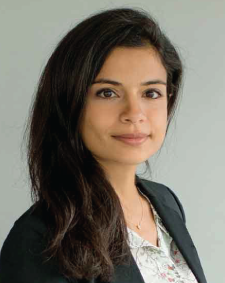 |
Bissan Ghaddar Assistant Professor, Management Sciences, Ivey Business School, University of Western Ontario Bissan Ghaddar is an Assistant Professor of Management Science at the Ivey Business School working on problems at the intersection of smart cities, IoT, and optimization models. Prior to joining Ivey Business School, she was as an Assistant Professor in Data Analytics at the Department of Management Sciences at the University of Waterloo. She has also worked on energy, water, and transportation network optimization at IBM Research and on inventory management problems at the Centre for Operational Research and Analysis, Department of National Defence Canada. She was invited for extended research visits at the Universität zu Köln in Germany and the University of Avignon in France. Dr. Ghaddar received a Ph.D. degree in operations research from the University of Waterloo, Canada. Her work has been published in prestigious journals such as Mathematical Programming, SIAM Journal on Optimization, Transportation Research, among others. Her research has been supported by national and international scholarships including NSERC, Cisco, H2020, and FP7 IIF European Union Grant. |
|
 |
Brian Rivard Adjunct Research Professor, Business, Economics and Public Policy, Ivey Business School, University of Western Ontario Brian Rivard is an Adjunct Professor and Director of Research for the Ivey Energy Policy and Management Centre, in the Richard Ivey School of Business at Western University. His area of expertise and study is electricity market design and regulation. Brian has experience as an energy consultant, most recently as a Principal at Charles River Associates. He also worked for the Independent Electricity System Operator (IESO) as Director of Markets. While working at the IESO, Brian was responsible for providing analysis of the impacts of changes to the IESO Market Rules, Market Design, government policies, and other industry initiatives. For almost 15 years at IESO, he helped support the development of market-based approaches to managing Ontario’s electricity system needs. In addition, Brian spent six years as a senior economist with the Canadian Competition Bureau. He has written articles for various publications such as the Energy Journal, Canadian Competition Record, Antitrust Law Journal, and the Journal of Economic Theory as well as chapters included in Competition Policy and Intellectual Property Rights in the Knowledge-Based Economy and Payments Systems in the Global Economy: Risks and Opportunities. He has also provided expert testimony before the US Federal Energy Regulatory Commission and the Ontario Energy Board. He received his MA and PhD in Economics from the University of Western Ontario. |
|
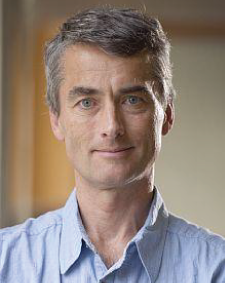 |
Holger Kleinke Professor & Program Director, Collaborative Graduate Nanotechnology Program, Chemistry, University of Waterloo Holger Kleinke's research focuses on finding and optimizing new thermoelectric materials. Thermoelectrics are capable of converting heat into electrical energy and vice versa. This environmentally friendly energy conversion currently has several applications, but is limited by its low efficiency. His research group is attempting to increase the efficiency so that thermoelectrics may be used to recover electricity from the nowadays abundant waste heat, e.g. in the exhaust of automobiles. |
|
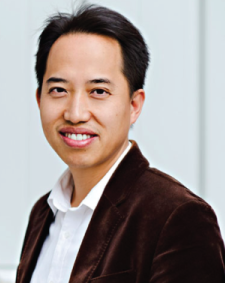 |
Zhongwei Chen Canada Research Chair in Advanced Materials for Clean Energy & Professor, Chemical Engineering, University of Waterloo Zhongwei Chen is a Chemical Engineering Professor, the Director of the Collaborative Graduate Program in Nanotechnology, and the head of the Applied Nanomaterials and Clean Energy Lab at the University of Waterloo. He is also a member of the Waterloo Institute for Nanotechnologyand a Canada Research Chair in Advanced Materials for Clean Energy. Professor Chen’s research group aims to provide sustainable energy infrastructures and resources for future generations by developing novel high performance nanostructured materials for use in clean sustainable technologies. Professor Chen holds 4 patents in technologies relating to sustainable energy infrastructures. The development of rechargeable zinc-air batteries is an exciting area of his research. Zinc-air batteries are partially comprised of oxygen, which does not need to be stored. This theoretically simplifies the design and increases the energy density of the cell, which creates the potential to attain the highest specific energy of any known battery technology. |
|
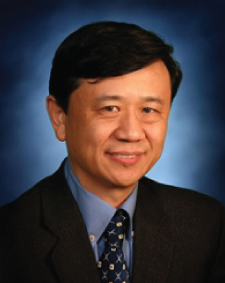 |
Andy (Xueliang) Sun Canada Research Chair in Development of Nanomaterials for Clean Energy; Fellow of the Royal Society of Canada; Fellow of the Canadian Academy of Engineering; Professor, Mechanical and Materials Engineering, University of Western Ontario Biography TBA |
|
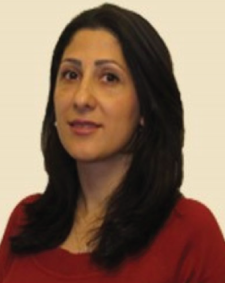 |
Samaneh Shahgaldi Research Associate,Energy research Center, University of Waterloo Dr. Samaneh Shahgaldi is a research associate at Energy research center, University of Waterloo. She received her BSc and MSc in organic chemistry and PhD degree in chemical engineering in 2013. She worked as a post-doctoral fellow at Hydrogen Research Institute (HRI) of the Université du Québec, and received Hydro-Quebec awards for two years. She has more than 45 papers published in high peer-reviewed international journals with over 780 citations. Her research work is focused on synthesis and characterization of novel nanomaterials and polymers for different applications of hydrogen storage and fuel cells. Currently, she is focused on developing membrane electrode assemblies and low cost catalyst for proton exchange membrane fuel cell application. |
|
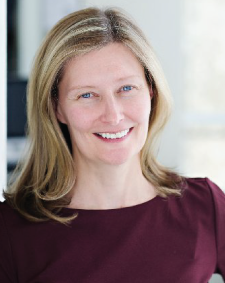 |
Catherine Burns Executive Director, Centre for Bioengineering and Biotechnology, University of Waterloo Catherine Burns is a Systems Design Engineering Professor and the Director of the Advanced Interface Design Lab at the University of Waterloo. She conducts research in Ecological Interface Design, cognitive work analysis, and graphical interface design and visualization, which has been applied in military systems, healthcare, power plant control, and oil and gas refining. Professor Burns’ current projects include mobile decision support tools for cardiac nurses, supporting situation awareness in power plant operators, diabetes management tools, and supporting human-to-human and human-to-agent collaboration in uninhibited aerial vehicle environments. Her research is sponsored by the Ontario Ministry of Health and Long Term Care, Bell University Labs, Research in Motion (RIM) and NSERC. |
|
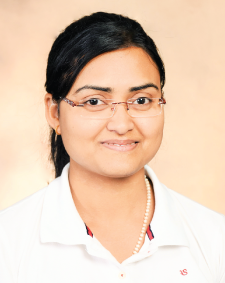 |
Rashmi Chandra Postdoctoral Researcher, Civil & Environmental Engineering, University of Waterloo Rashmi Chandra is a postdoctoral researcher at Civil and Environmental Engineering department, University of Waterloo. She obtained PhD in Biological sciences from Academy of Scientific and Innovative Research at CSIR-IICT. She worked at Tec de Monterrey, Mexico and Arizona State University. Her major research work is focused on waste to energy through strategic regulation of photosynthetic machinery towards diverse bioenergy generation routes and extensively studied the process of Photofermentative-Hydrogenesis, Biophotovoltaics, and Algal photochemical synthesis (Photo-Lipogenesis). She has 22 publications in peer-reviewed international journals and 7 book chapters along with several conference communications to her credit. She is the recipient of Dr. R. N. Sarma Memorial Best Junior Research Fellow Award for year 2012, AUCBT excellence award for 2013 given by BRSI and HEAM Scholar for year 2014 for my research contribution. Dr Rashmi Chandra is also member of Nation System of researcher Conacyte Mexico. She has been conferred Best Reviewer awards from Bioresource Technology journal in year 2017 and outstanding contribution in reviewing from International journal of hydrogen energy, Waste management, and Renewable energy. Rashmi Chandra also serving as guest editor for the Science of the Total Environment. |
|
 |
Trevor C. Charles Professor, Biology, University of Waterloo Dr. Charles is a professor in the Department of Biology of University of Waterloo, Director of Waterloo Centre for Microbial Research, and Founder and CSO of Metagenom Bio. He carries out research in bacterial genetics and is an expert in analyzing genetic material recovered directly from environmental samples, also known as functional metagenomics. In 2015, Dr. Charles was honoured with an Ontario Genomics Institute SPARK Award for an innovative project that uses waste methane to create renewable bioplastics. His research group studies the mechanisms of gene regulatory circuits that control the interactions of Rhizobiales bacteria such as Sinorhizobium meliloti with their eukaryal hosts. The group also develops methods for functional metagenomics using alternate surrogate hosts, and employs these methods to isolate novel genes with interesting functions from microbial community genomic libraries. Current research emphasis is on functional metagenomics, bioplastics, the microbiome in controlled environment agriculture, bacterial genome engineering, bio-economy, clean technologies, and sustainable communities. Prof. Charles has numerous awards to his credit such as the 2015 Fellowship of Association of Biotechnology and Pharmacy (India), 2015 International Award of the Ninth DBN Science and Technology Awards (China). He is also an associate editor of the Journal BMC Microbiology and is on the editorial board of Frontiers in Microbiology. His professional associations are with the American Society for Microbiology, Canadian Society of Microbiologists, International Society for Molecular Plant-Microbe Interactions, and International Society for Microbial Ecology. |
|
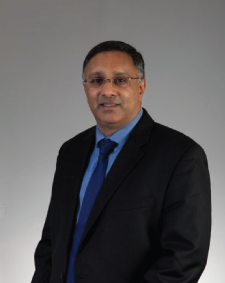 |
Tej Gidda Vice President, GHD; Adjunct Professor, Civil & Environmental Engineering, University of Waterloo Tej Gidda is Vice President of GHD, working in the fields of carbon emission reductions and waste management, with a focus on diversion technologies. He has been involved in a significant number if composting, anaerobic digestion, mixed waste processing, energy-from-waste and advanced biosolids treatment technologies in Ontario and elsewhere, as well as landfill gas management and leachate treatment. As an Adjunct Professor in Civil & Environmental Engineering at the University of Waterloo he is involved in funding applications and development of new approaches for energy production from waste materials, as part of collaborative research teams. |
|
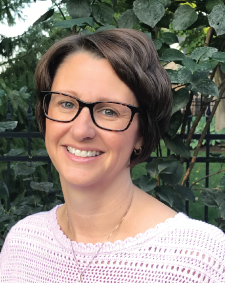 |
Tammy Bellamy Senior Project Engineer, Water Services, Regional Municipality of Waterloo Tammy Bellamy is a Senior Project Engineer of Wastewater Programs within the Water Services division at the Region of Waterloo. Her primary role is administering the Region’s contract with the Ontario Clean Water Agency (OCWA) to operate and maintain its wastewater treatment and pumping facilities. Tammy works collaboratively with OCWA to monitor wastewater treatment performance while also supporting capital projects related to process upgrades, optimization and infrastructure renewal. Tammy has been with the Region for seven years and during that time has successfully lead the Water Services energy savings program and played a key role the development and execution of their Corporate Energy Plan. She has great experience with innovative and collaborative projects to reduce energy consumption. Prior to joining the Region of Waterloo, Tammy spent 12 years as an Environmental Engineer in the automotive manufacturing sector leading programs related to air, waste and wastewater, as well as managing an extensive ISO 14001 Environmental Management System. She is a licensed professional engineer in Ontario with a Bachelor of Science in Engineering degree from the University of Guelph. |
Showcase
WISE is pleased to offer students the opportunity to showcase their work with a poster during the innovation showcase at Energy Day 2019. All energy related research is welcome to be displayed during the event and students are encouraged to stay to enjoy panels and take advantage of this excellent networking opportunity.
To register for the showcase please contact Jessica Strickler, jessica.strickler@uwaterloo.ca.
Area-based coordinated power system frequency control scheme
Etinosa Ekomwenrenren, PhD Candidate, University of Waterloo
Abstract:
The increasing penetration of inverter-connected renewable energy resources (RES) has increased the variability of active power supply and reduced the rotational inertia in the grid, resulting in faster system dynamics along with larger and more frequent frequency events. To mitigate these challenges, a fast, area-based coordinated control strategy is proposed. This optimization-based scheme partitions the power system into small areas, and utilizes fast, inverter-based resources in each area to estimate and correct load imbalances. The control strategy is validated on a detailed nonlinear 3-area power system model implemented on MATLAB’s SimPowerSystems.
Analysing the potential of biomass energy plants as a medium for the development of rural communities in the Central Himalayas
Gabrielle McMullan, School of Environment, Resources and Sustainability, University of Waterloo
Abstract:
Avani Bio Energy is a social enterprise in Uttarakhand, India, in the Central Himalayan region, that uses the fallen needle litter of the invasive Chir Pine tree (Pinus roxburghii) to power biomass energy plants. The biomass plants generate clean energy to power homes and sell back to the grid, hire villagers to manage the system, and control the spread of forest fires as the highly flammable biomass is removed. A baseline study was completed analyzing the potential socio-economic impacts of implementing the energy plants into communities; looking at potentials to employ and empower local women, improve overall household incomes, increase energy access and consistency and promote the development of rural economies. Qualitative and quantitative data was collected through in-person interviews with villagers during several week-long visits to the communities. Data collected includes information on household income and income source, education levels, fuel resources, and energy perspectives. Additionally, the potential impacts of clearing pine needle litter from the forest floor was analyzed. The ecological data provided an overview of forest structure and strata and species richness in four separate sample sites.
Cased-wellbore Compressed Air Energy Storage: An Advanced Energy Storage Solution for a Clean Energy Future
Wayne Sunghyun Park1, Sepideh Sarmast Skhvidi2
1Master of Applied Sciences Candidate,Civil and Environmental Engineering, University of Waterloo
2PhD Candidate, Mechanical and Mechatronics Engineering, University of Waterloo
Cased-Wellbore Compressed Air Energy Storage” (CW-CAES) is a form of Electrical Energy Storage (EES) where excess electricity produced is stored in the form of compressed air inside a well with a length between 500 - 1,500 m, cased with high-grade steel. Using cased well energy storage can be effective on the utility scale; it may serve as an alternative to batteries, with lower environmental impact and longer design life. CW-CAES systems can also be installed anywhere, reasonably independent of geological and geographical conditions, and it is relatively simple to deploy and decommission. To further improve its cyclic efficiency, adiabatic system design may be considered where produced heat from the compression process is captured and used on the expansion side of the system or for other useful purposes (e.g. green houses and home heating). The objectives of this study are to introduce the concept of CW-CAES and to demonstrate its capability by conducting energy analysis. Different numbers of compression and expansion stages, Thermal Energy Storage (TES), and heat exchange processes are considered to provide a more comprehensive simulation. It is concluded that storing both heat and power (as mechanical energy) in cased wellbores, with TES incorporated for a CW-CAES facility, and using multiple compression and expansion stages increase the cyclic efficiency.
Panels
Panel 1
Energy Services Delivery: Is there a changing of the guard?
The emergence of renewable energy technologies offers numerous development opportunities to both on and off-grid communities across Canada. The transition to sustainable energy future requires substantial efforts in developing, evaluating and advancing technical innovations and identifying and applying effective implementation strategies for those new technologies. It is not only a technological concern that carries the greatest challenge but also social and economical barriers, existing business models and regulatory constraints are often difficult to manage. Public-private partnerships can also accelerate the deployment of solutions and align the evolving business models with the core needs of the utility sector and end users. The engineers, innovators and system design operators will evaluate the changing trends in the contemporary energy industry related to electricity markets, decentralization of energy service delivery, demand-side management, R&D capital and investment and various types of energy delivery models.
Panel 2
Nano-based Energy Innovations: Breakthroughs or Bust?
Nanotechnologies provide a pathway to significant enhancement of energy efficiency solutions across energy sectors. Nanotechnology innovations can affect the entire value chain of the energy sector from primary resource extraction, conversion, and final use. Nanotechnology – operating on the scale of atoms and molecules – create dramatic breakthroughs and open new opportunities for use of smart materials, sensors and devices that drive intelligent systems. Top academic researchers and industry leaders will discuss theirs insights on nanotechnology-based energy systems in the areas of solar photovoltaics, energy storage (batteries), fuel cells, carbon utilization and capture, and energy transmission and distribution.
Panel 3
Bioenergy Solutions: Can it shape the transition to a low carbon future?
Bioenergy—fuel, heat, and power derived from biomass sources—is a low carbon alternative to fossil fuel sources. It is a dominant source of renewable energy in the world. Bioenergy solutions will play a constructive role in advancing climate goals, food security, better land use and sustainable energy choices. Biomass can make a substantial contribution to supplying future energy demand consistent with the UN sustainable development goals. This panel will explore strategies to foster increased use of renewable bio-based fuels that may catalyze the creation of new industries and businesses.
Parking Venue
WISE Energy Day will be held in Federation Hall at the University of Waterloo. We suggest that participants coming from off campus enter from Columbia Street West. For your convenience we have provided an interactive map for directions to the venue and visitor parking. Should you have any questions regarding parking at anytime during your stay please feel free to ask the enforcement officers (identified by bright green shirts with Parking Services decals), staff at the parking kiosks or stop by the Parking Office located in Commissary 154. Any of the staff would be happy to assist.
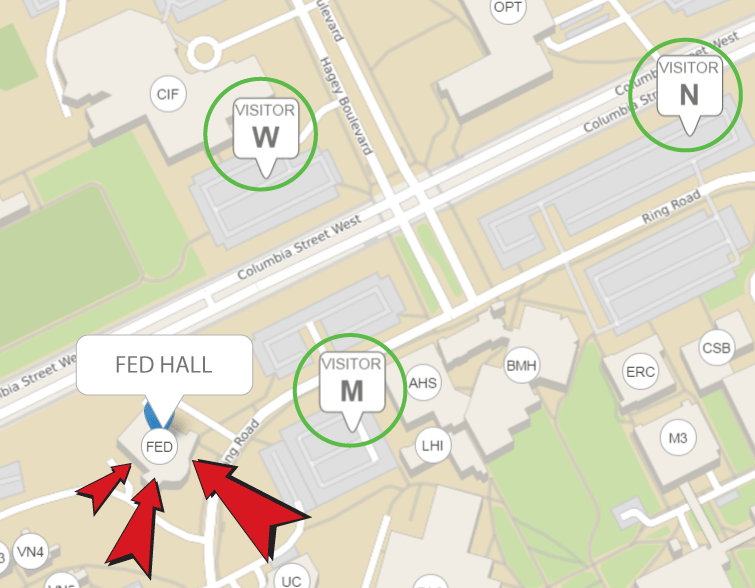
Visitor parking is available in Lots N, and W as shown above at a cost of $5.00 per day. Parking in M lot is available at the cost of $6.00 per day. Machines will only take master card or visa. They will not accept Amex, Tim Hortons Visa, or Visa Debit. There are signs on the machine at both the entrance and exit to indicate same. There are help buttons on all machines which will ring into the Parking office.
Contact Parking Services at 519-888-4567 x33100